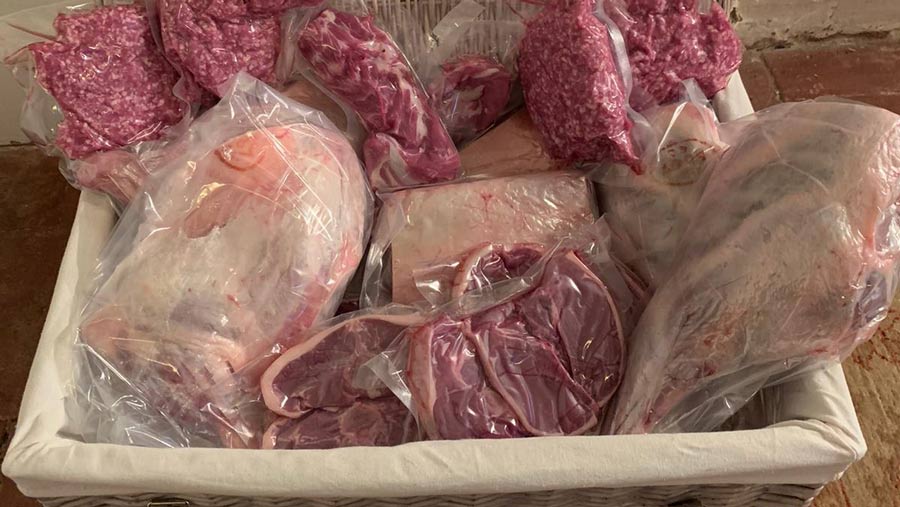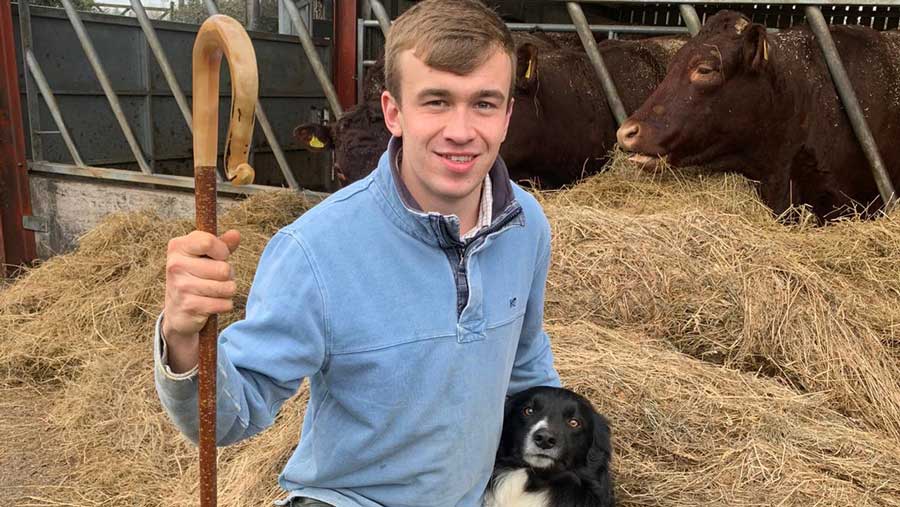Direct lamb sales from the farmgate help #FeedTheNation
 One of Leighton's lamb meat boxes
One of Leighton's lamb meat boxes Sheep farmers selling produce direct to consumers in boxes and at the farmgate will be among those the industry celebrates when Love Lamb Week returns next Tuesday (1 September).
The initiative is in its sixth year and is in part a chance to promote the direct sellers, who Phil Stocker, chief executive of the National Sheep Association (NSA), says are a crucial part of the market.
Many farmers have seen an increase in sales since the coronavirus pandemic, and this could encourage more sheep producers to consider this route to market in the future.
See also: #FeedTheNation: Growers hope veg box demand is here to stay
Mr Stocker told Farmers Weekly: “Selling direct and through box schemes does give farmers the chance to maybe add a bit of value to their products, but also to have that closer engagement with the public, to help them understand more about our industry.
“That is really crucial and I have felt for a long time, it may be a smaller part of our market, but all of our sheep farmers and markets benefit from the work that is being done by those direct sellers in terms of raising awareness and understanding.”
Young farmer’s lamb
Young farmer Leighton Snelgrove keeps 50 ewes at Boringwheel Mill Farm in Nutley, East Sussex. The 20-year-old is steadily growing his flock for his lamb box business.

Leighton Snelgrove and sheepdog Chap
Prices range from about £75-80 for half a lamb to £160 for a whole lamb. Slaughter and butchery costs is £40 per animal. The lambs are sent off at 45kg and normally come back at around 17-20kg deadweight.
Local deliveries
Mr Snelgrove then delivers the boxes to customers and pubs in his area.
He said: “Knowing what the customer wants and tailoring it is important. We pay a bit extra to get the meat cut depending on the customers’ needs.
“Selling direct is working out better financially at the moment. The way I am seeing it, I am trying to keep everything local. I deliver to my customers and they can see who has produced their meat and ask any questions.
“The lambs are out on grass and antibiotic use is kept as low as possible. I feel that buying local is better than imports from countries where you don’t know the provenance and how that meat has been produced.”
Mr Snelgrove said he wanted to grow his flock, with the ambition of eventually having his own farm shop or a supply contract with an existing shop in East Sussex.
Sheep sustainability
This year’s Love Lamb Week will have a particular focus on sustainability, which is something NSA chief executive Phil Stocker says the industry needs to promote more.
“Over the past 18 months or so there has been a lot of work going on to assess and measure the really good environmental, animal welfare and rural economy aspects of sheep production. Love Lamb Week gives us a great opportunity to talk about this and to show the value of sustainable meat production.”
Mr Stocker also paid tribute to Love Lamb Week founder Rachel Lumley, a passionate Cumbrian sheep farmer who died last month, aged 37.
“It would be great to see Love Lamb Week really go through with a splash this year, to give her a lot of recognition for the effort, enthusiasm and drive she put in.”
The campaign aims to build on recent retail success for lamb. Figures for the 12-week period covering May, June and early July showed that consumer spending on lamb in Britain was £139.6m, up 19.2% on the same period last year.
The data also showed a substantial increase in families either coming back to eating lamb or purchasing lamb for the first time.
#FeedtheNation
Farmers Weekly is getting behind the #FeedtheNation campaign to back UK farmers working flat out to produce safe, affordable and reliable food to feed the nation this harvest.
With our partners, we are raising public awareness of this campaign by highlighting the actions farmers are taking to get food to consumers.
Join in the campaign by sharing your stories with us on Facebook, Twitter or Instagram using the hashtag #FeedtheNation or email us at philip.case@markallengroup.com or telephone 020 8652 4905.


